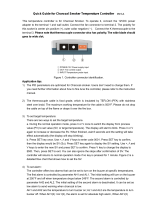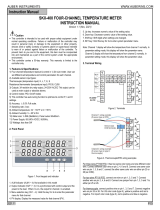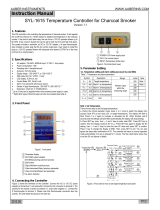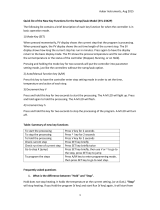Page is loading ...

AUBER INSTRUMENTS WWW.AUBERINS.COM
2020.09 P1/4
AT210 Wireless Digital Thermometer
Version 2.0 (Sep, 2020)
1. Features
The AT210 wireless digital thermometer can be used for remote
temperature monitoring. It consists of two units: AT210-A (thermometer
unit) and AT210-B (remote monitor unit). The AT210-A connects to the
temperature sensor and displays measured value. It also sends the
measured temperature reading to the AT210-B and allow remote
monitoring and remote parameter setting through wireless connections.
The AT210-B can communicate with up to 10 units of AT210-A. The
AT210-A and AT210-B thermometers have two alarm settings for a built-
in buzzer. One can be used for high limit alarm and the other can be
used for low fuel (limit) alarm. This thermometer can also store the
highest temperature reading with a time stamp during the temperature
monitoring process. The AT210-A has a 12VDC 2.5mm power output
that is synchronized with the build-in alarm buzzer, which can be used
to drive an external buzzer or other devices. Both units are powered by
12VDC through a 2.1mm AC adapter for continuous operation. It can
also be powered by a car battery directly.
2. Specifications
Power input: 12VDC (2.1mm OD connector)
AC adaptor: 100-240V, 50/60Hz input. 12 VDC, 1 Amp output
Power consumption: <0.5W
Sampling rate: 2 samples/second
Accuracy: 0.2% full scale
Thermometer reading range: -320 ~ 2300° F (-200 ~ 1300° C)
External buzzer output (on AT210-A): 12VDC (2.5mm OD connector), 1
Amp, synchronized with the internal buzzer
Internal buzzer: two alarms (high limit or low limit alarm)
Dimension: 2.8 x 3.5 x 1.2" (70 x 90 x 30 mm)
3. Front panel
1
2
4
5
3
7
6
Figure 1. Front panel of AT210-A and AT210-B.
① Digital display window.
② Alarm indicator: blinking when alarm is triggered.
③ Peak value indicator: stay solid on when peak value is displayed;
blinking when the time stamp of the peak value is displayed.
④ Set key: enter code; confirm input value.
⑤ Shift key: shift digit; mute the alarm buzzer.
⑥ Down key: change digit value; move to the previous parameter;
display peak temperature and the time when peak temperature is
reached/ reset peak values.
⑦ Up key: change digit value / move to next parameter / change
brightness.
4. Connectors on the meter
The connectors on the meter are shown in Figure 2. Connecting the 12V
DC power adapter to the connector 1 from wall outlet. Connecting the
external buzzer to connector 2. The polarity for this socket is center pin
positive (+), outer collar negative (−). Connect the K thermocouple to
terminal 3. Please note that thermocouple connector also has polarity.
The wide blade should go to the wide slot.
Figure 2. Bottom view of AT210-A (left, thermometer unit and AT210-B
(right, remote monitor unit).
① Power Input - 12VDC power supply input (2.1 mm O.D.).
② Power Output - 12VDC output (2.5 mm O.D.).
③ Probe Input - temperature probe input.
5. Basic functions for temperature monitoring
During the normal temperature monitoring mode, you can mute the
alarm, check the peak value, and change display brightness with the
keys on the front panel (Figure 3).
3. Switch display
between bright and
dimmed.
1. Temporarily
mute the alarm
2. Check peak value
Figure 3. key functions
Function Descriptions:
1. Temporarily mute the alarm. When the temperature reaches the
alarm temperature, the alarm indicator will flash and meter will start
beeping. Press Shift key once can temporarily mute the alarm. Alarm
will be triggered again if the alarm set temperature is reached again.
Please see Section 6 for detailed explanation alarm settings.
Instruction Manual

AUBER INSTRUMENTS WWW.AUBERINS.COM
2020.09 P2/4
2. Check the peak value. Press Down key once to show peak
temperature, and the MAX LED will light up; press Down key again to
show the time stamp, i.e., the time when peak temperature is reached
(count from the start of the timer, unit is seconds), and the MAX LED
will flash. If the temperature continues rising, a new peak temperature
and its time will be written to the memory to replace the previous peak
value. Please see Section 9 for details.
3. Dimmer the display brightness. Press Up key to toggle the display
brightness between the dimmed display and the normal bright display.
The brightness of the dimmed display is determined by the parameter
“brit” described in the later section of the manual (see Section 7).
6. Alarm setting (code 0001)
The meter has two programmable alarms that can be set to turn on the
buzzer at specified temperatures. The alarm1 is controlled by
parameters AH1 and AL1; the alarm2 is controlled by AH2 and AL2.
These parameters can be accessed by code 0001 (see Table 1).
Table 1. Alarm parameters.
END END Exit
AL2 AL2 Alarm2 off temperature -1999 ~ 9999 250
AH2 AH2 Alarm2 on temperature -1999 ~ 9999 250
AL1 AL1 Alarm1 off temperature -1999 ~ 9999 479
AH1 AH1 Alarm1 on temperature -1999 ~ 9999 480
Symbol Name Description Setting Range Initial Note
AH1 and AH2 are called alarm on temperature, i.e. the temperatures at
which the Alarm1 and Alarm2 will turn on; AL1 and AL2 are called alarm
off temperature, i.e. the temperatures at which the Alarm1 and Alarm2
will turn off. When AH1 > AL1(or AH2 > AL2), the alarms are set as a
high limit alarm. When AH1 < AL1(or AH2 < AL2), the alarm is set as a
low limit alarm. For a high limit alarm, the alarm buzzer should be on
once the temperature rise above AH, and it should be off only when the
temperature drops below AL. In contrast, for a low limit alarm, the alarm
buzzer should be on when the temperature drops below AH, and it
should be off only when the temperature rises above AL.
For example, when the temperature unit is set to F (Fahrenheit), AH1 =
900, and AL1 = 800, the buzzer will go off once the measured
temperature is higher than 900° F; the buzzer will stop when the
temperature drops below 800° F. In another case, when AH2 = 180, AL2
= 185, the alarm2 is set as a low limit alarm. If the temperature drops
below 180° F, the buzzer will go off (on); when the temperature rises
above 185° F, the buzzer will stop.
User can press the Shift key (“>”) to mute the buzzer. The alarm will buzz
again if the alarm temperature moves out of the alarm zone (between
AH and AL) and re-enters it again. For instance, AH1 = 900, AL1 = 800,
current temperature is higher than 900, and the alarm is muted. In this
case, the temperature has to drop below 800 and rise above 900 again
to trigger the alarm buzzer. To disable the alarms, set AH and AL to the
same value, i.e., AH1 = AL1 and AH2 = AL2.
Steps to set an alarm are described below as well as in the flow chart in
Figure 4:(1) Press SET key, change the code to 0001, and press SET
again to enter alarm setting mode. (2) Press Up and Down key to select
a parameter (AH1, AL1, AH2, or AL2). (3) Press SET to view the value
of the parameter.(4) Use Shift, Up, and Down key to change the value.(5)
Press SET key to confirm the value and exit from this parameter.(6)
Press Up or Down key to select the new parameter.(7) To exit this mode,
press SET key when “End” is displayed. The procedure is showed in the
flow chart in Figure 4.
Operation Mode
XXXX
0001
Enter Code
Parameter Display
Buzzer On Temp
AH1
0480
0479
0250
0250
AL1
AH2
AL2
Buzzer Off Temp
Buzzer On Temp
SET SET
SET
SET
SET
SET
SET
SET
END
SET
SET
SET
Buzzer Off Temp
Figure 4. Steps of setting alarms. In this example, alarm1 is set as a high
limit alarm at 480; alarm2 is disabled.
7. Alarm setting (code 0001)
The parameters for system configuration are listed in Table 1.
Table 1. System configuration parameters.
C-F
FILT
Symbol
Inty
PSb
C-F
FILT
Name
Inty
PSb
Brit Brit
END END
Temperature unit
Digita l filter
Description
Input senso r type
Input offset
Brightness level of dimmed LED
Exit
°C, °F
0 ~ 3
Setting Range
K
-1000 ~ 8000
1-4
F
0
Initial
k
0
4
3
Note
1
2
1 5
6
Note 1. Inty (Input sensor type). This parameter defines the sensor type
that is used for the thermometer. If you purchased the thermometer
bundle, it is already set for the probe included in the package. You don’t
need to change it.
Note 2. PSb (input offset). This is to set an offset value to compensate
the error produced by the sensor. For example, if the meter displays 5
ºC when probe is in ice/water mixture, setting PSb= -5 will make the
meter display 0 ºC. You can use shift key (second key from the left) to
shift to the first left digit, then press down key once to enter minus sign.
Note 3. FILt (digital Filter). If the temperature reading fluctuates due to
input noise, a digital filter can be used to smooth the input signal. “FILt”
may be configured in the range of 0-3. Higher the value, stronger the
filtering effect. A strong filter increases the stability of the readout, but
causes longer delay in responding to the temperature change. Set
FILt=0 will disable the filter.
Note 4. C-F (temperature unit). Set to C if you want to display
temperature in Celsius. Set to F for Fahrenheit.
Note 5. Brit (display dimmer). This parameter sets the brightness level
of the dimmed LED display. You can switch the LED brightness level
between the dimmed and the normal using UP key. However, the normal
brightness level of the LED display is equal to level 4. So if Brit is set to
4, you won’t see and change in the brightness of LED display when
pressing UP key.
Note 6. End. Exit the parameter setting mode.

AUBER INSTRUMENTS WWW.AUBERINS.COM
2020.09 P3/4
Steps to set system parameters are described below as well as in the
flow chart in Figure 5:
(1) Press SET key, change code to 0089, and press SET again to enter
the system configuration mode.
(2) Press Up or Down key to select the parameter to be changed.
(3) Press SET to view the value of the parameter.
(4) Press Shift, Up, and Down key to enter a new value.
(5) Press SET to confirm.
(6) Press Up or Down to select the new parameter.
(7) To exit the menu, press SET when “End” is displayed.
Operation Mode
0089
Enter Code
Parameter Display
FiLT
XXXX
SET SET
SET
Input Type
C-F
PSb
Inty
Brit
xxxx
SET
xxxx
SET
xxxx
SET
SET
xxxx
Input Offset
Digital Filter
Temperature Unit
End
xxxx
SET
Brightness level of dimmed
LED
Figure 5. Flow chart of how to set system configuration parameters.
8. Wireless connection setting (code 0110)
The parameters for wireless connection can be accessed by code 0110.
The parameters are listed in Table 2. Thermometer unit will be named
as AT210-A and remote monitor unit will be named as AT210-B.
Table 2. Wireless connection parameters.
tACy
Tdl y
Symbol
bAud
Id
tACy *
tdly *
Name
bAud
Id
End End
Samplin g rate
Hand sh ake time
Description
Baud rate
Unit ID
Exit
0.5 ~ 60 per second
2 ~ 60
Setting Ra nge
1200, 2400, 3600,
9600
0 ~ 240
1.0
3.0
Initial
9600
1
10 *
9 *
Note
7
8
Note 7. Baud (Baud rate for communication). This should be left as
default.
Note 8. Id (Unit ID). Each AT210-A should be assigned with a unique
Unit ID. The default value is 1. The value of the Unit ID can range from
0 to 240. An AT210-B unit can communicate with up to 10 units of
AT210-A. For example, if you have two AT210-A units, you can set their
Unit ID to 1 and 2 respectively. Then, when the AT210-B ID is set to 1,
it will read the temperature of AT210-A whose Unit ID is 1. When the
AT210-B ID is set to 2, it will read from AT210-A whose Unit ID is 2.
Please do not set the same unit ID for multiple AT210-A units.
Note 9. tdly* (Hand shake time). This is the time interval (unit in seconds)
after which the AT210-B will attempt to read signal from the AT210-A
again. If the AT210-B receives signal during this hand shake time, it will
refresh and display the current reading at the assigned cycle rate.
Otherwise, it will display the previous reading for the rest of the current
hand shake cycle. If there is still no signal received during the entire hand
shake time, the AT210-B will display four dashes (“- - - -“). This setting
can prevent the AT210-B from frequently switching between
temperature reading and four dashes. If the AT210-B and the AT210-A
is far away from each other or the signal is weak, user should increase
the hand shake time. Placing the AT210-A and AT210-B too close to
each other may also result in no reading on the AT210-B.
Note 10. tACy* (Sampling rate). This parameter sets how frequently the
AT210-A refresh its reading. The default sampling rate is 1 per second.
The unit is s
-1
or Hz.
Note *. These two parameters are only available on the AT210-B.
9. Peak value setting (code 0037)
The peak value (the highest measured temperature) and the peak time
(the time at which the peak values is read) can be stored. These
parameters for peak values can be accessed by code 0037. The
parameters are listed in Table 3 below.
Table 3. Alarm setting parameters.
Symbol
mA
mAt
Name
mA
mAt
Description
Peak valu e
Peak value time
Setting Ra nge
On/off
On/off
Initial
On
On
Note
11
12
End End Exit
Note 11. mA (Peak Value). The highest temperature reading. By default
this function is turned on. The Peak Value will be kept in the memory
unless cleared. After the unit is powered on, the previously recorded
Peak Value and its time stamp will remain in the memory unless: 1) a
new peak value overwrites the previous peak value, 2) or the memory
has been reset. Hold the Down key for 2 seconds will reset both the peak
value and its time stamp to 0. The recorded peak value can be checked
by pressing DOWN key during the normal operating mode; press DOWN
key again to display the Peak Value Time; press and hold Down key for
2 seconds to clear the stored Peak Value and the Peak Value Time.
Note 12. mAt (Peak Value Time). The time stamp of the Peak Value. By
default, this function is turned on. The time is tracked by the build-in timer
which is activated whenever the mAt function is being turned on. The
current Peak Value Time will be overwritten by the new Peak value time.
The Peak value time can be checked by pressing DOWN key again in
the peak value mode. Pressing the DOWN key 2 seconds will clear the
Peak value as well as the Peak value time. Every time the unit is
restarted or the Peak Value is cleared, the timer will start over again (unit
in seconds).
10. Communication Between the AT210-B and AT210-As.
When the communication between a AT210-B and a AT210-A is
established, all the settings and operations on these two units are
“mirrored”, except for the Unit ID and the operation which temporarily
mute the alarm (for the safety reason). You can set all of these
parameters from either the AT210-A or AT210-B.
1) Mirrored operations and parameters. Operations and readings on
one unit will be mirrored to the other unit. Change of the alarm setting
on the AT210-B will also be synchronized to the AT210-A, or vice
versa. The temperature reading and peak values on the AT210-A will
also be synchronized between the AT210-B and the AT210-A. For
example, when the peak value is cleared from the AT210-A, the new
peak value will be recorded at the AT210-A and then mirrored to the

AUBER INSTRUMENTS WWW.AUBERINS.COM
2020.09 P4/4
AT210-B. When the peak value is cleared from the AT210-B, this
operation will also be synchronized to the AT210-A, and the peak value
will be cleared.
2) Muting the alarms. When you press the SHIFT key to mute the
alarm buzzer, it will only be effective to the buzzer on this unit. The
buzzer on the other unit will continue sound until temperature left the
alarm zone, or the SHIFT key on that unit is pressed.
3) Placing distance. Placing the AT210-A and the AT210-B too far or
too close will result in bad signal reception on the AT210-B. Signal
reception can be affect by distance, physical obstacles, and other
factors. The AT210-B and the AT210-A can be placed 100 feet away
from each other in an open space.
Figure 6. Velcro mounting (left) and stainless steel plate mounting (right).
11. Placing and Mounting the Meter.
The meter should be placed in a working environment where
temperature is -20-50° C (0-100° F). It should be placed away from high
heat to protect the plastic housing and electronics. Two mounting options
are provided: 1) A pair of Velcro fastener. The Velcro has a pressure
sensitive adhesive backing. You can remove the protective film from the
hook piece and stick it to the back of the meter (see Figure 6). Then
remove the protective film from the loop piece and install it onto the wall.
Please note that the pressure sensitive adhesive on Velcro is industrial
grade with strong holding force. It needs to be stick on a solid surface.
Don’t put it on a drywall because it may peel off the paint if you decided
to remove it later. 2) A stainless steel mounting plate. The plate allows
the meter to be hung on a hook or a nail. It also allows the meter to be
permanently mounted with a screw. The bottom part of the stainless
steel mounting plate is covered with pressure sensitive adhesive. To
install it onto the meter, peel off the pink colored releasing film; press it
firmly onto the back of the meter (see figure 6).
NOTE: This equipment has been tested and found to comply with the
limits for a Class B digital device, pursuant to part 15 of the FCC Rules.
These limits are designed to provide reasonable protection against
harmful interference in a residential installation. This equipment
generates, uses and can radiate radio frequency energy and, if not
installed and used in accordance with the instructions, may cause
harmful interference to radio communications. However, there is no
guarantee that interference will not occur in a particular installation. If
this equipment does cause harmful interference to radio or television
reception, which can be determined by turning the equipment off and on,
the user is encouraged to try to correct the interference by one or more
of the following measures:
1) Reorient or relocate the receiving antenna.
2) Increase the separation between the equipment and receiver.
3) Connect the equipment into an outlet on a circuit different from that to
which the receiver is connected.
4) Consult the dealer or an experienced radio/TV technician for help.
Caution: Any changes or modifications to this device not explicitly
approved by manufacturer could void your authority to operate this
equipment.
This device complies with part 15 of the FCC Rules. Operation is subject
to the following two conditions: (1) This device may not cause harmful
interference, and (2) this device must accept any interference received,
including interference that may cause undesired operation.
Auber Instruments Inc.
5755 North Point Parkway, Suite 99,
Alpharetta, GA 30022
www.auberins.com
Copyright © 2019 Auber Instruments Inc. All rights reserved.
No part of this datasheet shall be copied, reproduced, or transmitted in any
way without the prior, written consent of Auber Instruments. Auber Instruments
retains the exclusive rights to all information included in this document.
/















